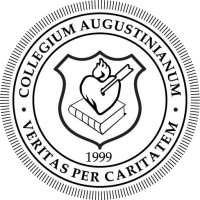
The Research Degree
The Collegium Augustinianum offers non-residential, research degrees based upon the European model of higher education, focused on individual research toward the writing of the thesis or dissertation directed by a professor in the respective field.
The (Research) Master's Degree
The Master’s degree generally requires a minimum of one year of research and one year of writing the thesis under the supervision of a professor.
Generally, the student is required to submit a research proposal to the respective faculty at the time of application to the program. The Master's degree requires the successful completion of a thesis with a minimum of fifty pages, written under the supervision of a professor.
Generally, when a thesis has been accepted by the supervisor, student is required to be examined on his or her thesis by a tribunal of professors who grade it.
REQUIREMENTS FOR ACCEPTANCE
1) The prospective student must hold a BA degree in philosophy or in a related discipline in order to be considered for acceptance into the Master's degree program. Students seeking admission who do not have sufficient philosophy credits may be accepted on the condition of completing the required reading list under the mentorship of a professor.
2) A writing sample of a research paper.
3) Recommendations from three professors from one's undergraduate studies.
The (Research) Doctoral Degree
The Doctoral degree involves research and the writing of the dissertation under the supervision of a directing professor. At the time of application to the doctoral programs, the student is required to submit a research proposal. In accordance with our statutes, the doctoral student must present a formal research proposal to the Rector within two months of acceptance into the doctoral program that must receive approval by the supervising professor and the Dean of the respective Faculty.
Although none of our research degrees require residency, students are required to meet with their respective supervising professor on a monthly basis whether in person or via zoom conference.
Prior to the conclusion of the program, the doctoral student is required to demonstrate competency in at least two languages, including one ancient language and one modern language relevant to the student’s research. At the discretion of the Dean of the respective Faculty, the student may also pass a language course in lieu of an examination. The Dean of the respective Faculty may also dispense the student from this requirement in circumstances of scholarly achievement.
Upon completion of the dissertation, and with the approval of the supervising professor and the Dean, the student may submit his or her doctoral "argumentum" to the Rector, outlining one's thesis, or theses, indicating one's original contribution to the respective science. Upon approval from the Rector, the doctoral student may register for the defense, which involves a tribunal of three professors including the director of the dissertation. Once the dissertation has been accepted for defense, the Rector and the Dean could invite a recognized scholar to participate as a guest Reader on the defense tribunal if necessary. At this stage, the doctoral candidate will schedule his or her doctoral defense in consultation with the Dean of the respective Faculty.
Upon successful completion of the doctoral defense, the defense is graded by the respective professors of the doctoral tribunal. Finally, with the publication of at least an excerpt of the dissertation, the doctoral degree is conferred. If applicable, the doctoral degree may be conferred with honors.
REQUIREMENTS FOR ACCEPTANCE
1) The prospective student must hold an MA degree in philosophy, theology or in a related discipline (e.g. Classics, Literature, Humanities) in order to be considered for acceptance into the Doctoral degree program. Students seeking admission who do not have sufficient philosophy or theology credits may be accepted on the condition of completing the required reading list under the mentorship of a professor.
2) A writing sample of a research paper.
3) Recommendations from three professors.
4) Evidence of competency in one ancient language (i.e. Greek or Latin) and one modern language relevant to one's scholarly interests.